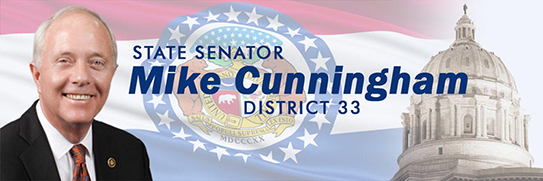 Last week, Missouri lawmakers returned to the State Capitol in Jefferson City for the First Extra Session of the Second Regular Session of the 99th General Assembly and the constitutionally-mandated veto session.
Last week, Missouri lawmakers returned to the State Capitol in Jefferson City for the First Extra Session of the Second Regular Session of the 99th General Assembly and the constitutionally-mandated veto session.
The governor made 21 line-item vetoes, totaling more than $12 million vetoed from the state’s 2019 operating budget which started July 1. He also vetoed three other pieces of legislation, two of which he put on the agenda for an extraordinary legislative session dealing with an expansion of the state’s drug treatment courts and legislation promoting high school computer science courses. None of the governor’s vetoes were overridden during the annual veto session. Following the veto session the Legislature drafted and passed two measures during the extraordinary session aiming to expand drug treatment courts and to promote careers in science, technology, engineering and mathematics (STEM).
House Bill 2 aims to improve and expand Missouri’s drug treatment courts. These courts play an important role in keeping offenders out of prison and encouraging them to become productive citizens. Through this legislation, circuit courts will have the ability to establish special treatment court divisions to serve as an alternative for the judicial system for certain cases. These special courts are designed to handle cases involving alcohol, drugs and other forms of substance abuse. By allowing every circuit court in the state to establish treatment court divisions, we are giving local communities the ability to best decide how to rehabilitate substance abuse offenders. Statistics indicate that these special court divisions have the ability to lower recidivism rates when compared with both incarceration and probation. By expanding these successful drug treatment courts, I believe this legislation allows for individuals to receive the vital, life-saving treatment they need instead of being incarcerated in Missouri’s already over-crowded prison system.
The goal of House Bill 3 is to encourage high school students to pursue careers in science, technology, engineering and math. The legislation requires the Department of Elementary and Secondary Education (DESE) to develop a STEM Career Awareness Program for students in grades six through eight. The goal of this program is to introduce students to STEM-related careers through an online-based program. In addition, the legislation requires DESE to develop a graduation policy that allows students to fulfil one unit of academic credit with a district-approved computer science course in place of any math, science or practical arts unit required for high school graduation. By allowing computer science courses to count toward graduation, we are incentivizing students to learn vital computer skills that will prepare them for success outside of the classroom. Computer science-related jobs are growing at a rate faster than any other career in our country. In Missouri, we currently have more than 10,000 open computer science jobs. These are good-paying jobs, and I believe this legislation has the potential to encourage and prepare our students to succeed in today’s technology-driven workforce.
As always, I appreciate it when groups from around Missouri and from our community back home come to visit me at the Capitol. If you would like to arrange a time to come and visit me in Jefferson City, or if you ever have any questions, please don’t hesitate to contact my Capitol office at (573) 751-1882.
